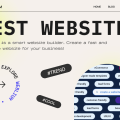
How to Build an Effective Website If You Are Not a Web Designer
With the advent of website builders, creating a site ceased to be a chore. Yet, if you’ve got no prior experience in design, you will definitely have one question beating in your head: “Where should I start?” Well, a simple interface of an online platform won’t give you the right answer. That’s why we decided to turn to a professional.
Jeff Gothelf, a world-famous expert in user experience design and author of Lean UX, answered our questions. Read on to find hands-on recommendations on how to build an effective website if you are not a web designer.
How to understand what I should have on my website if I’m not a professional?
Customer conversations are the best place to start. Your goal should be to speak with customers to understand what they are trying to achieve, what problems they face, what they are doing now to solve that problem, and how your offer can help them do a better job.
Ultimately, that’s how you determine what you should have on your website.
How to start building a website yourself?
First, you need to understand:
- why you need a website
- what you are trying to achieve with it
- what your customers are going to do there (e.g. Do they want to learn something? Do they want to be entertained or buy something?)
Is the competitor analysis important for website creation?
It’s absolutely critical because there are a lot of leading practitioners already in the space. And the question is what they are doing that is not enough and that you think you can be doing better.
And to understand that, you have to understand where the product your competitors are providing fails to meet those needs. If you are going to compete against any other website on the Internet, you need to understand what you can do better.
What about a target audience? Do you have any methods for choosing the correct target audience?
I think there’s enough market research that you can be doing to size up market opportunities.
Let’s say you want to sell piano lessons in New York. You can do a little bit of demographic research to see how many children and how many teachers of piano lessons are in New York. This way you get a sense of the size of the market.
Ultimately though you need to have a hypothesis who you are building your website for. When you find those people and talk to them, try to understand what they are trying to achieve and whether or not this is the people you want to sell your services to.
Again, I don’t want to sound like a broken record but talking to customers is the best possible thing you can be doing.
Let’s talk about your Lean UX methodology. Can it be applied by non-professionals who want to build a website on their own?
Editor’s note: Lean UX design is executed in short iterations. After each iteration designers make user tests to obtain feedback as early as possible. Based on that, they decide what to improve. Lean UX envisions tight cooperation of the entire team.
Yes, absolutely. Initially, the Lean UX is asking you: “Are you solving a real problem for a real customer in a meaningful way?”.
That is all based on creating some kind of hypothesis that you believe you can build this website for this type of people; and here’s why you think these people would benefit from your products or services, and why they would care.
Based on that you can validate whether or not you’re spending your time on the right idea.
How to measure the effectiveness of your website?
Well, it’s pretty difficult to even for professionals. You need to set some kind of a goal.
For example: “I’d like to see these many people come to my website” or “I’d like to see a certain number of people sign up for my newsletter.”
In other words, you need to have some kind of success criteria for yourself. It doesn’t matter what kind of criteria you choose. Just set a goal and check if you manage to hit it. If you don’t, go and figure out why.
Particularly, all website builders provide handy web analytics tools and they are simple. You will be able to see how many people come to your website, how many pages they consume, how long they stay on site and so on.
You should have a sense of what you need to track.
For example: “I provide piano lessons in New York and I’d like to see 200 people come to my website every week. I’d also like to see at least 5 people reach out to me every week.”
And again, you should head into this with some kind of sense of what success should look like in your particular case. Because if you don’t get it, you need to get back and think about what was wrong and how you can make your website better, including copy, design, etc.
Is it better to spend more time researching the audience and industry or start experimenting and testing straightaway?
I think people jump into a business far too quickly without validating if their business will succeed.
I used to live in New Jersey, where there are essentially three types of businesses: nail salons, deli and pizza places. Every time someone opened up a new business, it was one of the three. A little town had 5 delis, 6 pizza places, and 4 nail salons, with a total population of 11,000 people, half of whom were children.
To me, “I want to open up a pizza place” is the same thing as “I want to build a website”.
People don’t think about their target audience, the service and value they are providing, like why one pizza place is better than the other.
The answer is that it’s not. They are all exactly the same. They offer the same kind of service for the same price tag.
If people looked critically at why they are opening a business, what problem they are solving and how it makes the situation better for their potential customers, their businesses would stand a better chance of success. It’s always worth taking context into account to create a quality user experience.
Do you think it’s enough to copy a competitor to get a good result?
Again, you can, and people do it all the time. The question is: “Why should I buy a product from you and not from your competitor who already has a reputation?”
You see this a lot in the travel industry.
Booking.com is an eight-hundred-pound gorilla in the travel industry and everyone copies it. Now, everyone hates the user experience of Booking.com – it’s the worst.
Yet, you see all these other travel websites copy Booking.com because they think this is the way to move forward. At this point, all of these online travel agencies become a commodity. And so the sides that win out in this type of situation are travel aggregators, like the Kayak.com.
Then the question is: “Why are you creating a copycat business?” Is it because you think there’s enough revenue to go around for you?
Ultimately, the only strategy you have in that business is a features arms race. They have a chatbot – we need a chatbot. They built a mobile app so we need to build a mobile app.
There’s no winning there – it’s just trembling water while trying to stay in the game, which to me doesn’t feel like a good strategy for building a successful sustainable business.
Do you think people need a lesson in web design before they get down to building a website?
Sure, they need it but they are not going to take it.
The reason why they turn to website builders is that somebody has already done the hard part for them and designed the templates. All they gonna do is plug their content in and get a well-designed good-looking website.
Is it possible to create an effective website with a site builder?
Yes, I must confess. I’ve personally done it. The last couple of website we’ve built was created on a website builder. It’s easy, it’s fast, it looks good, it’s easy to maintain and it’s cheap.
Do you think that website builders are transforming the profession of a web designer?
I think they’re forcing design studios to think about what value they offer. I mean you can build a good-looking sustainable business online without ever dealing with any kinds of agencies or consultants. But ultimately it all depends on what your aspiration is and how large your business can get.
Some people can run their business forever on those platforms without ever dealing with an agency or consultant. Other people will inevitably want to create more sophisticated systems, at which point they will have to resort to hiring an agency or consultant.
The sophistication of business will probably demand a more sophisticated back-end system.
What to consider when choosing a web design agency or contractor?
This is such a tough thing because, again, it’s partially about your budget, it’s partially about what you need, it’s partially about how you want to work.
There are so many companies out there that just want an agency to build them an app or a website for $20,000-$50,000 and let them know when it’s done. There are also a lot of design shops that want to work more collaboratively and build a different kind of relationships. They want to be partners rather than outsourcing vendors.
I think it depends on how you’d like to work, what kind of relationships you’d like to have with a web design agency, and ultimately what kind of budget you have. Also, consider what you’d like to do yourself and what you want them to do on their own. It’s tough and there’s an infinite number of options out there.
What to consider when choosing a web design agency or contractor?
When it comes to the choice itself, I’d personally look at their portfolio and talk to people who have worked with them because references are the key. And again, think about what you are trying to get out of people and what you can ultimately support on your own.
I’ve known small businesses who hired consultants and freelancers to build systems for them. Then, the project ended and the consultants moved on. Now, the small business has to maintain their website, and their content management system, and their CRM system, and that’s definitely not what they’re good at.


